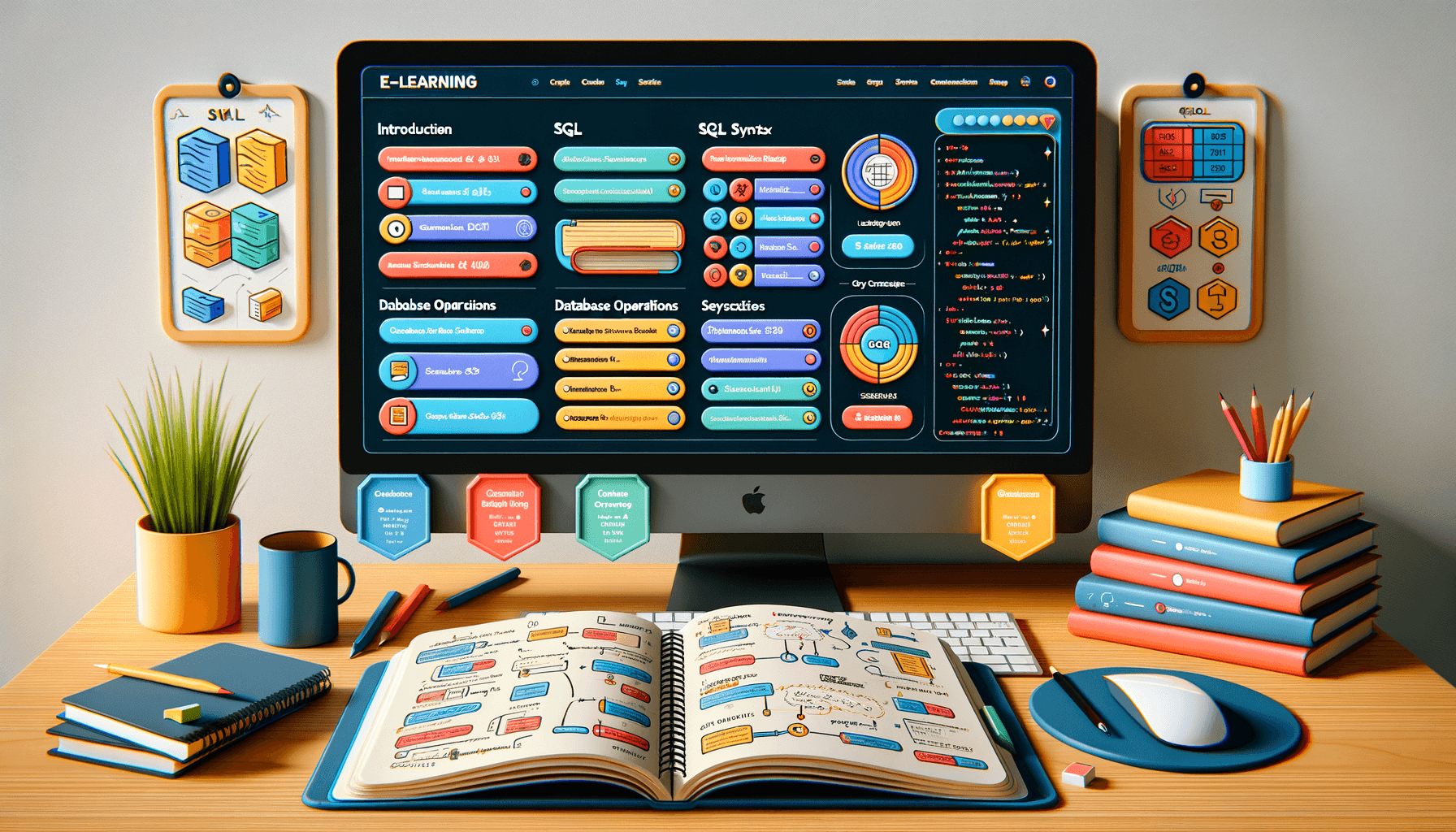A big variety of articles and resources

What is an easy and quick way to learn SQL?
 Sia Author and Instructor
Learn SQL
Sia Author and Instructor
Learn SQL
12 minute read
Learning SQL can seem like a big task, but it's easier than you might think. SQL is a language used to manage and retrieve data from databases. It's a skill that can open many doors in tech and business. This article will guide you through simple and fast ways to learn SQL, even if you're just starting out.
Key Takeaways
- SQL is essential for managing and retrieving data from databases.
- Choosing the right platform and setting up your environment are the first steps.
- Basic SQL commands are easy to learn and form the foundation of SQL knowledge.
- Online courses and tutorials offer structured and flexible learning paths.
- Hands-on practice and joining SQL communities can greatly enhance your learning experience.
Understanding SQL and Its Importance
Definition of SQL
SQL, or Structured Query Language, is a standard language used to communicate with databases. It allows us to create, read, update, and delete data stored in a relational database. Mastering SQL basics is essential for anyone looking to work with data.
Role of SQL in Data Management
SQL plays a crucial role in data management by enabling efficient data manipulation and retrieval. It helps us organize and manage large datasets, making it easier to analyze and draw insights. Without SQL, handling complex data operations would be much more challenging.
Benefits of Learning SQL
Learning SQL offers numerous benefits, including improved job prospects and the ability to handle data more effectively. It is a valuable skill for various roles, from data analysts to software developers. Additionally, SQL knowledge can enhance our ability to work with other data-related technologies.
Understanding SQL is not just about learning a language; it's about gaining a tool that empowers us to manage and analyze data efficiently.
- SQL is essential for data management.
- It improves job prospects.
- It enhances our ability to work with data-related technologies.
Getting Started with SQL
Choosing the Right SQL Platform
When beginning with SQL, selecting the right platform is crucial. There are several popular options like MySQL, PostgreSQL, and SQLite. Each has its own strengths and use cases. For instance, MySQL is widely used in web applications, while PostgreSQL is known for its advanced features and robustness. Choosing the right platform depends on your specific needs and the type of projects you plan to work on.
Setting Up Your SQL Environment
Setting up your SQL environment involves installing the SQL server and configuring it for use. This process can vary depending on the platform you choose. Generally, it includes downloading the software, running the installer, and setting up user permissions. It's important to follow the installation guides provided by the platform to ensure a smooth setup.
Basic SQL Commands
Learning basic SQL commands is the first step in mastering SQL. These commands include SELECT, INSERT, UPDATE, and DELETE. Each command serves a specific purpose, such as retrieving data or modifying existing records. Practicing these commands will help you understand how to interact with databases effectively.
Mastering these basics will lay a strong foundation for more advanced SQL topics.
Essential SQL Concepts for Beginners
Data Types and Structures
Understanding data types and structures is crucial when learning SQL. Data types define the kind of data that can be stored in a table, such as integers, strings, or dates. Structures, on the other hand, refer to how data is organized within the database. Mastering these basics will help you write more efficient queries and manage your data effectively.
Primary Keys and Foreign Keys
Primary keys and foreign keys are essential for maintaining relationships between tables. A primary key uniquely identifies each record in a table, while a foreign key links one table to another. This relationship is vital for organizing and retrieving data efficiently. Without understanding these keys, it would be challenging to manage complex databases.
Basic Query Syntax
Learning the basic query syntax is the first step in interacting with a database. SQL queries allow you to retrieve, insert, update, and delete data. The basic structure of a query includes commands like SELECT, INSERT, UPDATE, and DELETE. Grasping these commands will enable you to perform essential database operations and set the foundation for more advanced SQL skills.
To truly excel in SQL, it's important to practice writing queries regularly. This hands-on experience will solidify your understanding and make you more comfortable with the language.
Learning SQL Through Online Courses
Top Online SQL Courses
There are many online courses available that can help you learn SQL quickly and effectively. Some of the top platforms include Coursera, Udemy, and Codecademy. These courses are designed to cater to different learning styles and paces, making it easier for everyone to find a course that suits their needs.
Features of Effective SQL Courses
Effective SQL courses often include a mix of video lectures, interactive exercises, and real-world projects. Hands-on projects are particularly important as they allow you to apply what you've learned in a practical setting. Look for courses that offer quizzes and challenges to test your understanding.
How to Choose the Right Course
When choosing an SQL course, consider factors such as the course content, the instructor's expertise, and the course reviews. It's also helpful to look for courses that offer lifetime access so you can revisit the material whenever you need a refresher. Additionally, some courses provide certificates upon completion, which can be a valuable addition to your resume.
Investing time in a well-structured SQL course can significantly boost your data management skills and open up new career opportunities.
Hands-On Practice with SQL
Importance of Practical Exercises
Engaging in practical exercises is crucial for mastering SQL. Hands-on practice helps us understand how SQL works in real-world scenarios. It allows us to apply theoretical knowledge and see immediate results, which reinforces learning.
Common SQL Exercises for Beginners
For beginners, starting with simple exercises can build a strong foundation. Here are some common exercises:
- Creating and modifying tables
- Inserting, updating, and deleting records
- Writing basic queries to retrieve data
- Using aggregate functions like COUNT, SUM, and AVG
- Joining tables to combine data from multiple sources
Using Sample Databases
Using sample databases is an excellent way to practice SQL. These databases provide a controlled environment where we can experiment without the risk of damaging real data. Websites like [sqlskillz.com vs w3schools.com](https://www.sqlskillz.com) offer sample databases that are perfect for beginners. We can learn at our own pace and practice various SQL commands without needing a credit card to sign up.
Practical exercises are the bridge between theoretical knowledge and real-world application. They help us build confidence and competence in using SQL effectively.
Utilizing SQL Tutorials and Guides
Finding Reliable SQL Tutorials
When starting with SQL, it's crucial to find reliable tutorials. Look for resources that are well-reviewed and frequently updated. Mastering the basics of SQL is essential, so choose tutorials that cover fundamental concepts clearly. Websites like sqlskillz.com vs udemy.com offer beginner-friendly content that you can follow at your own pace.
Step-by-Step SQL Guides
Step-by-step guides are invaluable for learning SQL. They break down complex topics into manageable steps, making it easier to understand and apply new concepts. These guides often include practical exercises, which are vital for reinforcing your learning.
Video Tutorials vs. Text-Based Guides
Both video tutorials and text-based guides have their advantages. Video tutorials can be more engaging and easier to follow, especially for visual learners. On the other hand, text-based guides allow you to learn at your own pace and revisit specific sections as needed. Consider your learning style when choosing between the two formats.
Practical exercises are key to mastering SQL. They help you apply what you've learned and identify areas where you need more practice.
Leveraging SQL Community Resources
Joining SQL Forums and Groups
Engaging with SQL forums and groups can be incredibly beneficial. These platforms allow us to ask questions, share knowledge, and learn from others' experiences. Being part of a community helps us stay updated with the latest trends and best practices in SQL.
Participating in SQL Challenges
SQL challenges are a fun way to test and improve our skills. They often present real-world problems that require creative solutions. By participating, we can enhance our problem-solving abilities and gain confidence in our SQL knowledge.
Networking with SQL Professionals
Connecting with SQL professionals can open doors to new opportunities. Networking allows us to learn from experts, get career advice, and even find mentors. It's a great way to build relationships that can support our growth in the field.
Engaging with the SQL community not only boosts our technical skills but also helps us grow professionally by connecting with like-minded individuals.
Advanced SQL Topics for Further Learning
Subqueries and Joins
Subqueries and joins are essential for combining data from multiple tables. Mastering these techniques allows us to perform complex queries and extract meaningful insights from large datasets. Subqueries are queries nested within another query, while joins combine rows from two or more tables based on related columns.
Indexing and Optimization
Indexing is crucial for improving the performance of SQL queries. By creating indexes on columns that are frequently used in search conditions, we can significantly speed up data retrieval. Optimization involves fine-tuning queries to run more efficiently, which is vital for handling large databases.
Stored Procedures and Functions
Stored procedures and functions are reusable SQL code blocks that can be executed as needed. They help in automating repetitive tasks and ensuring consistency in data processing. Understanding how to create and use these can greatly enhance our ability to manage and manipulate data effectively.
Delving into advanced SQL topics not only broadens our knowledge but also equips us with the skills needed to tackle more complex data challenges.
Applying SQL Skills in Real-World Scenarios
In data analysis, SQL is a powerful tool for extracting and manipulating data. We can use SQL to filter, sort, and aggregate data, making it easier to find trends and insights. Mastering SQL allows us to handle large datasets efficiently, which is crucial for making data-driven decisions.
Business intelligence relies heavily on SQL to transform raw data into meaningful information. By writing complex queries, we can generate reports and dashboards that help businesses understand their performance. This skill is essential for anyone looking to work in data analytics or business intelligence.
Real-world case studies show how SQL is used across various industries. For example, in retail, SQL helps manage inventory and sales data. In healthcare, it assists in patient record management. These examples highlight the versatility and importance of SQL in solving practical problems.
SQL is not just a technical skill; it's a critical tool for making informed decisions in any data-driven field.
Continuous Learning and Improvement
Staying Updated with SQL Trends
In the fast-paced world of technology, it's crucial to stay updated with the latest SQL trends. Mastering SQL basics is just the beginning; we need to keep learning to stay relevant. Regularly reading blogs, attending webinars, and following industry leaders on social media can help us stay informed about new developments.
Advanced Certifications in SQL
Pursuing advanced certifications can significantly boost our SQL skills and career prospects. Certifications from recognized institutions validate our expertise and can open doors to advanced job roles. Some popular certifications include Microsoft Certified: Azure Data Scientist Associate and Oracle Database SQL Certified Associate.
Resources for Ongoing SQL Education
There are numerous resources available for ongoing SQL education. Online platforms like Coursera, Udemy, and Khan Academy offer courses that allow us to learn at our own pace. Additionally, joining SQL forums and groups can provide valuable insights and support from the community.
Continuous learning is key to mastering SQL and becoming a valuable asset in any data-driven role.
Continuous learning is key to staying ahead. Our courses are designed to help you grow your skills and advance your career. Don't miss out on the chance to learn from experts and get personalized guidance. Visit our website to explore our course offerings and start your journey today!
Conclusion
Learning SQL doesn't have to be hard or time-consuming. By focusing on the basics and practicing regularly, anyone can get a good grasp of this important skill. Whether you are a beginner or looking to improve your data skills, there are many resources available to help you learn at your own pace. With dedication and the right approach, mastering SQL can open up many opportunities in the tech world. So, start your learning journey today and unlock the power of databases!
Frequently Asked Questions
What is SQL?
SQL stands for Structured Query Language. It's used to manage and manipulate databases.
Why should I learn SQL?
Learning SQL is important because it helps you manage data efficiently, which is essential in many tech and business roles.
Is SQL hard to learn?
No, SQL is considered one of the easier programming languages to learn, especially for beginners.
What are some basic SQL commands?
Some basic SQL commands include SELECT, INSERT, UPDATE, and DELETE. These commands help you retrieve and modify data in a database.
Do I need any prior experience to start learning SQL?
No, you can start learning SQL without any prior experience. It's designed to be beginner-friendly.
Where can I practice SQL?
You can practice SQL on various online platforms that offer interactive exercises and sample databases.
How long does it take to learn SQL?
The time it takes to learn SQL varies, but with consistent practice, you can grasp the basics in a few weeks.
Can learning SQL help me in my career?
Yes, learning SQL can open up many career opportunities in fields like data analysis, software development, and business intelligence.
Related Articles

A Beginner's Guide to Running a SQL Query Efficiently
8 minute read

Effective Ways to Enhance Your Skills with SQL Practice
9 minute read





